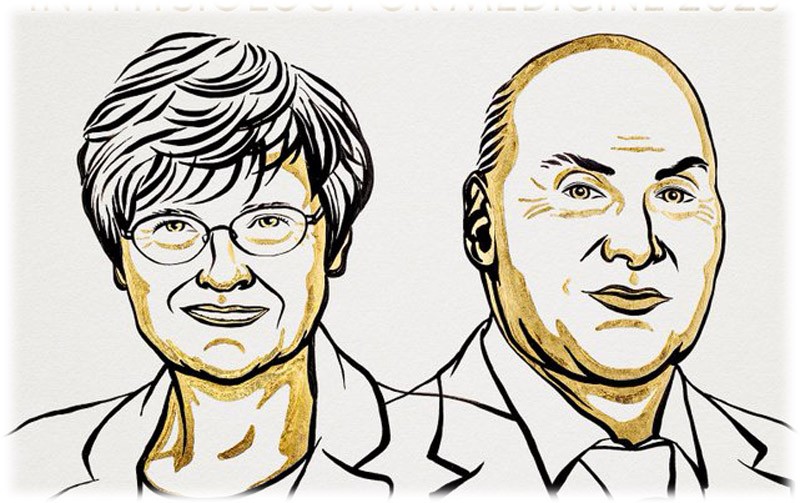 Nobel Prize
Katalin Kariko and Drew Weissman got the Nobel Prize for Medicine for developing effective mRNA vaccines against COVID-19 since the pandemic started in 2020. Photo Courtesy: The Nobel Prize X page
Nobel Prize
Katalin Kariko and Drew Weissman got the Nobel Prize for Medicine for developing effective mRNA vaccines against COVID-19 since the pandemic started in 2020. Photo Courtesy: The Nobel Prize X page
Katalin Kariko, Drew Weissman named Nobel Prize winners in medicine for their work in mRNA COVID-19 vaccines
Katalin Kariko and Drew Weissman got the Nobel Prize for Medicine for developing effective mRNA vaccines against COVID-19 since the pandemic started in 2020.
"Through their groundbreaking findings, which have fundamentally changed our understanding of how mRNA interacts with our immune system, the laureates contributed to the unprecedented rate of vaccine development during one of the greatest threats to human health in modern times," read a statement issued by the Nobel Assembly at Sweden’s Karolinska Institutet.
Karikó and Weissman noticed that dendritic cells recognize in vitro transcribed mRNA as a foreign substance, which leads to their activation and the release of inflammatory signaling molecules.
They wondered why the in vitro transcribed mRNA was recognized as foreign while mRNA from mammalian cells did not give rise to the same reaction. Karikó and Weissman realized that some critical properties must distinguish the different types of mRNA.
BREAKING NEWS
— The Nobel Prize (@NobelPrize) October 2, 2023
The 2023 #NobelPrize in Physiology or Medicine has been awarded to Katalin Karikó and Drew Weissman for their discoveries concerning nucleoside base modifications that enabled the development of effective mRNA vaccines against COVID-19. pic.twitter.com/Y62uJDlNMj
RNA contains four bases, abbreviated A, U, G, and C, corresponding to A, T, G, and C in DNA, the letters of the genetic code. Karikó and Weissman knew that bases in RNA from mammalian cells are frequently chemically modified, while in vitro transcribed mRNA is not.
They wondered if the absence of altered bases in the in vitro transcribed RNA could explain the unwanted inflammatory reaction.
To investigate this, they produced different variants of mRNA, each with unique chemical alterations in their bases, which they delivered to dendritic cells. The results were striking:
The inflammatory response was almost abolished when base modifications were included in the mRNA.
This was a paradigm change in our understanding of how cells recognize and respond to different forms of mRNA.
Karikó and Weissman immediately understood that their discovery had profound significance for using mRNA as therapy.
These seminal results were published in 2005, fifteen years before the COVID-19 pandemic.
In further studies published in 2008 and 2010, Karikó and Weissman showed that the delivery of mRNA generated with base modifications markedly increased protein production compared to unmodified mRNA.
The effect was due to the reduced activation of an enzyme that regulates protein production.
Through their discoveries that base modifications both reduced inflammatory responses and increased protein production, Karikó and Weissman had eliminated critical obstacles on the way to clinical applications of mRNA.
Interest in mRNA technology began to pick up, and in 2010, several companies were working on developing the method. Vaccines against Zika virus and MERS-CoV were pursued; the latter is closely related to SARS-CoV-2.
After the outbreak of the COVID-19 pandemic, two base-modified mRNA vaccines encoding the SARS-CoV-2 surface protein were developed at record speed.
Protective effects of around 95% were reported, and both vaccines were approved as early as December 2020.
Top Headlines
-
Health
Diabetes, muscle loss and the illusion of quick fixes: Why lifestyle correctionnot shortcutsremains our strongest medicine
February 18, 2026
-
Health
Kolkata: Rotary Club of Calcutta Pointers, Indian Cancer Society host cancer awareness, screening camp
February 17, 2026
-
Health
Akhil Bharat Jaiguru Sampradaya and Omkarnath Mission volunteers care for terminally ill patients at Mahamilan Math hospice
November 05, 2025
-
Health
Ayurveda and Skin Health in the Modern Age
October 09, 2025
-
Health
MedSage expands footprint with new branch in Rampurhat
October 04, 2025
-
Health
Vijaya Diagnostic Centre inaugurates State-of-the-Art Centre featuring first advanced 3 Tesla MRI in Kolkata
September 11, 2025
-
Health
Ayurveda and the urban woman: Practical science for a healthier, calmer life
September 07, 2025
-
Health
Rotary Club of Belur strengthens Kolkata healthcare with donation to Ramkrishna Mission Seva Pratishthan
August 25, 2025
-
Health
Parampara Ayurveda founder Dr. Debabrata Sen shares wellness strategies for desk-bound professionals
August 08, 2025
-
Health
Kolkata: Mega health camp transforms lives in Ultadanga slum with free multi-specialty services
August 02, 2025
